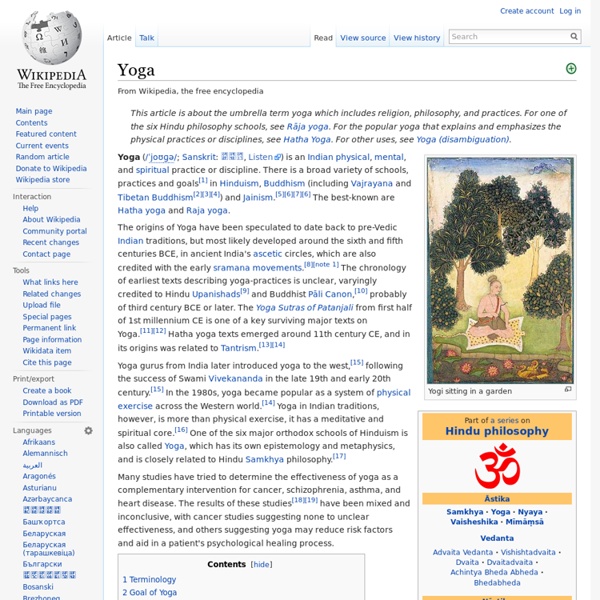Asana
In the practice of Yoga, Asana denotes the art of sitting still[1] and also any posture useful for restoring and maintaining a practitioner's well-being and improving the body's flexibility and vitality, cultivating the ability to remain in seated meditation for extended periods.[2] Such asanas are known in English as "yoga postures" or "yoga positions". Any way that we may sit or stand is an asana while a posture used in yoga is called a yogasana. Modern usage includes lying on the back, standing on the head and a variety of other positions.[2] In yoga asana refers both to the place in which a practitioner (yogin or yogi if male, yogini if female) sits and the posture in which he or she sits.[3] In the Yoga Sutras, Patanjali defines asana as "to be seated in a position that is firm, but relaxed".[4] Patanjali mentions the ability to sit for extended periods as one of the eight limbs of his system, known as Raja yoga,[5] but does not reference standing postures or kriyās. Benefits[edit]
Yoga Basics Column - Not All Yoga Is Created Equal
You say Ashtanga, I say Kundalini. What's the difference? Use this guide to find the right yoga for you. By Jennifer Cook As studies continue to reveal yoga's many health benefits, this centuries-old Eastern philosophy is fast becoming the new fitness soul mate for workout enthusiasts. Contemporary devotees range from high-powered execs trying to keep hearts beating on a healthy note to image-conscious Hollywood stars striving for sleek physiques.
Benefits of yoga
Benefits of Yoga At the outset, we must understand what we can gain out of this wonderful practice At the physical level, yoga and its cleansing practices have proven to be extremely effective for various disorders. To get a sampling of how yoga benefits health disorders, please visit the Yoga Therapy section. More importantly, yoga is extremely effective in:
The Power Of Yoga
Stars do it. Sports do it. Judges in the highest courts do it. Let's do it: that yoga thing. A path to enlightenment that winds back 5,000 years in its native India, yoga has suddenly become so hot, so cool, so very this minute. It's the exercise cum meditation for the new millennium, one that doesn't so much pump you up as bliss you out.
Greece Yoga Retreat
The Mongolian yurts are light and airy inside, sleeping between one to four people. They have comfortable beds with mosquito nets, coco-mat mattresses, plenty of shelving, and share an outdoor bathroom carved into the rocks, with a sea grass roof. Pathways and steps provide access to the yurt platforms, each with outdoor seating, positioned high among rocks and trees with beautiful sea views. Food at Itha 108 is fresh, sumptuous and made up of local produce.
Yoga Health Benefits, History, Types, Statistics, Equipment, Poses and Postures on MedicineNet
Benefits of Yoga Q: I would like to start taking yoga classes. Please explain the different types of yoga and the benefits of each type.
38 Health Benefits of Yoga
If you’re a passionate yoga practitioner, you’ve probably noticed some yoga benefits—maybe you’re sleeping better or getting fewer colds or just feeling more relaxed and at ease. But if you’ve ever tried telling a newbie about the benefits of yoga, you might find that explanations like “It increases the flow of prana” or “It brings energy up your spine” fall on deaf or skeptical ears. Researchers Are Catching On to Yoga’s Benefits As it happens, Western science is starting to provide some concrete clues as to how yoga works to improve health, heal aches and pains, and keep sickness at bay. Once you understand them, you’ll have even more motivation to step onto your mat, and you probably won’t feel so tongue-tied the next time someone wants Western proof.
Yoga Health Benefits: Flexibility, Strength, Posture, and More
Why do I need to register or sign in for WebMD to save? We will provide you with a dropdown of all your saved articles when you are registered and signed in. Yoga is a great way to work on your flexibility and strength. Just about everyone can do it, too -- it's not just for people who can touch their toes or want to meditate.
The Benefits of Yoga
The benefits of yoga provide both instant gratification and lasting transformation. In the fitness world, both are extremely important. Too much time with too few results can be incredibly discouraging, and monotonous routines week after week can lead to stagnation. Yoga can change your physical and mental capacity quickly, while preparing the mind and body for long-term health. Yoga is for everyone Most yoga studios and local gyms offer yoga classes that are open to all generations and fitness levels.



